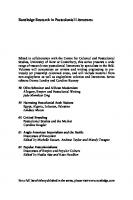Theories of Crime Through Popular Culture 3030544338, 9783030544331
This textbook brings criminology theories to life through a wide range of popular works in film, television and video ga
323 72 3MB
English Pages 240 [250] Year 2021
Table of contents :
Preface
Acknowledgment
Contents
Notes on Contributors
List of Figures
List of Tables
1: An Introduction to Criminological Theory and Popular Culture
An Overview of Criminology
Theories as Essential Curriculum
Applying and Observing Theories at Work
Popular Criminology and This Book
Moving Forward
References
2: Deterrence Theory and Batman
Two Facets, Same Subject
Holy Ingredients, Batman (The Swiftness, Certainty, and Severity of Punishment)
Batman’s and Beccaria’s Boundaries
Becoming Legends
References
3: Social Learning Theory and Mean Girls
A Brief Introduction to Social Learning Theory
Differential Association
Differential Reinforcement (Burgess & Akers, 1966)
Social Learning Theory: Learned Behavior
Means Girls Summary
Social Learning Theory in Mean Girls
Differential Association
Definitions
Differential Reinforcement
Imitation
Sequence and Feedback Effects
Conclusion
References
4: General Strain Theory and The White Shadow
General Strain Theory: An Introduction
Detachment from Conventional Others
The Cost of Criminal Coping
Basketball as a Conventional Coping Resource
Conclusion
References
Episodes
Pilot (Season 1, Episode 1)
Pregnant Pause (Season 1, Episode 5)
That Old Gang of Mine (Season 1, Episode 7)
Needle (Season 2, Episode 9)
The Death of Me Yet? (Season 2, Episode 22)
5: Anomie and The Purge
Merton’s Anomie
The Purge Universe
Society, Anomie, and Strain
The American Dream in a New Society
Universalism and Inequality
Merton’s Five Modes of Adaptation
The Purge as a Market Economy
Socialization
Social Control
Conclusion
References
6: Rational Choice Theory and Friends
Ross’ List
Joey’s Bankruptcy and Stubbornness
Monica’s Decision to Leave Richard
Ross and Rachel’s Annulment
Chandler and Rachel: Cheesecake Thieves
The Mugging of Science Boy
Chandler the Doctor and Monica the Minister
Conclusion
References
7: Opportunity Theories and Super Mario Bros.
Introduction
Mario Is a Murderer
Environmental Criminology
Rational Choice Perspective
One Player Game: Readiness
World 1-1: Choice-Structuring Properties
Thank You, Mario! Your Quest Is Over: Desistance
Routine Activity Approach
Activity Spaces and the Routine Activities of the Mushroom Kingdom
Mario’s Friends as Handlers and the Rest of the “Two Triplets”
Policy Implications and Empirical Evidence
References
8: Opportunity Theories and The Bachelor
Introduction
The Bachelor: An Overview
Criminal Opportunity Theories
Rational Choice
Routine Activities
Crime Pattern Theory
Applying Criminal Opportunity to The Bachelor
Conclusion
References
9: Routine Activity Theory and 13 Reasons Why
Introduction
Routine Activity Theory
Episode 1
Episode 2
Episode 3
Episode 4
Episode 5
Episode 6
Episode 7
Episode 8
Episode 9
Episode 10
Episode 11
Episode 12
Episode 13
Conclusion
References
10: Self-Control Theory and The Office
Self-Control Theory: An Overview
Applying Self-Control Theory to Michael Scott
Impulsivity
Simple Tasks
Risk-Seeking
Physical Activities
Self-Centered
Temper
Conclusion
References
For Further Reading
Episodes
Health Care (Season 1, Episode 3)
Sexual Harassment (Season 2, Episode 2)
The Fire (Season 2, Episode 4)
The Fight (Season 2, Episode 6)
Michael’s Birthday (Season 2, Episode 19)
Drug Testing (Season 2, Episode 20)
The Convict (Season 3, Episode 9)
Back from Vacation (Season 3, Episode 11)
Women’s Appreciation (Season 3, Episode 21)
Beach Games (Season 3, Episode 22)
Fun Run (Season 4, Episode 1)
Money (Season 4, Episode 4)
Local Ad (Season 4, Episode 5)
Branch Wars (Season 4, Episode 6)
Survivor Man (Season 4, Episode 7)
Weight Loss Part II (Season 5, Episode 2)
Business Ethics (Season 5, Episode 3)
Frame Toby (Season 5, Episode 9)
The Surplus (Season 5, Episode 10)
Michael Scott Paper Company (Season 5, Episode 23)
Gossip (Season 6, Episode 1)
The Promotion (Season 6, Episode 3)
Double Date (Season 6, Episode 9)
Murder (Season 6, Episode 10)
Scott’s Tots (Season 6, Episode 12)
Nepotism (Season 7, Episode 1)
Counseling (Season 7, Episode 2)
Christening (Season 7, Episode 7)
Viewing Party (Season 7, Episode 8)
11: Collective Efficacy Theory and Mister Rogers’ Neighborhood
A Brief Introduction to Collective Efficacy
Social Control and Community Attachment
Factors Influencing Collective Efficacy, Social Control, and Attachment
Mister Rogers’ Neighborhood as a Center of Collective Efficacy
Food Insecurity in the Neighborhood
Deviance and Anger in the Neighborhood of Make-Believe
Conclusion
References
12: Life-Course Theory and Romance
Life-Course Criminology and Desistance
Ontogenetic Theories
Sociogenetic Theories
Narrative Theories
The Power of Film
Film Summaries
Representations of Life-Course Criminology in Romance Films
Conclusion
References
13: Labeling Theory and Joker
Becker’s Labeling Theory
Application to Joker
Discussion
Conclusion
References
14: Hegemonic Masculinity and Game of Thrones
Theory: Hegemonic Masculinity and Structured Action
Ramsay: The Worst Person on Television
The Torture of Theon Greyjoy
Military Betrayals
Myrcella, Tansy, and the Girls of Dreadfort
The Rape of Sansa Stark
The Murder of Lord Roose Bolton, Lady Walda Bolton, and Baby Boy Bolton
Battle of the Bastards
Theoretical Analysis
Hegemonic Masculinity in Westeros
Bastardy: Baseborn Children
Legitimization
Conclusion
References
Episodes and DVD Extras
Winter Is Coming (Season 1, Episode 1)
Cripples, Bastards, and Broken Things (Season 1, Episode 4)
The Climb (Season 3, Episode 6)
Mhysa (Season 3, Episode 10)
The Lion and The Rose (Season 4, Episode 2)
The Mountain and the Viper (Season 4, Episode 8)
Kill the Boy (Season 5, Episode 5)
Unbowed, Unbent, Unbroken (Season 5, Episode 6)
The Gift (Season 5, Episode 7)
Book of the Stranger (Season 6, Episode 4)
The Iron Throne (Season 8, Episode 6)
15: Critical Criminology and Hunger Games
Introduction
The Hunger Games
Critical Criminology
State Crime
Illegal Domestic Surveillance
Human Rights Violations
State-Corporate Crime
State Violence
Conclusion
References
16: Radical Criminology and Star Wars
A Primer in Radical Criminology
A Long Time Ago, in a Galaxy Far, Far Away
Government Controlled Narrative
Using the Law to Root Out Political Dissidence
“You Know About the Rebellion Against the Empire?” Rebellion as Radicalism
The Power of the Dark Side: Internalized Oppression and Self-Negation
Genocide and the Erasure of Unwanted Peoples
Conclusion
References
Index
Preface
Acknowledgment
Contents
Notes on Contributors
List of Figures
List of Tables
1: An Introduction to Criminological Theory and Popular Culture
An Overview of Criminology
Theories as Essential Curriculum
Applying and Observing Theories at Work
Popular Criminology and This Book
Moving Forward
References
2: Deterrence Theory and Batman
Two Facets, Same Subject
Holy Ingredients, Batman (The Swiftness, Certainty, and Severity of Punishment)
Batman’s and Beccaria’s Boundaries
Becoming Legends
References
3: Social Learning Theory and Mean Girls
A Brief Introduction to Social Learning Theory
Differential Association
Differential Reinforcement (Burgess & Akers, 1966)
Social Learning Theory: Learned Behavior
Means Girls Summary
Social Learning Theory in Mean Girls
Differential Association
Definitions
Differential Reinforcement
Imitation
Sequence and Feedback Effects
Conclusion
References
4: General Strain Theory and The White Shadow
General Strain Theory: An Introduction
Detachment from Conventional Others
The Cost of Criminal Coping
Basketball as a Conventional Coping Resource
Conclusion
References
Episodes
Pilot (Season 1, Episode 1)
Pregnant Pause (Season 1, Episode 5)
That Old Gang of Mine (Season 1, Episode 7)
Needle (Season 2, Episode 9)
The Death of Me Yet? (Season 2, Episode 22)
5: Anomie and The Purge
Merton’s Anomie
The Purge Universe
Society, Anomie, and Strain
The American Dream in a New Society
Universalism and Inequality
Merton’s Five Modes of Adaptation
The Purge as a Market Economy
Socialization
Social Control
Conclusion
References
6: Rational Choice Theory and Friends
Ross’ List
Joey’s Bankruptcy and Stubbornness
Monica’s Decision to Leave Richard
Ross and Rachel’s Annulment
Chandler and Rachel: Cheesecake Thieves
The Mugging of Science Boy
Chandler the Doctor and Monica the Minister
Conclusion
References
7: Opportunity Theories and Super Mario Bros.
Introduction
Mario Is a Murderer
Environmental Criminology
Rational Choice Perspective
One Player Game: Readiness
World 1-1: Choice-Structuring Properties
Thank You, Mario! Your Quest Is Over: Desistance
Routine Activity Approach
Activity Spaces and the Routine Activities of the Mushroom Kingdom
Mario’s Friends as Handlers and the Rest of the “Two Triplets”
Policy Implications and Empirical Evidence
References
8: Opportunity Theories and The Bachelor
Introduction
The Bachelor: An Overview
Criminal Opportunity Theories
Rational Choice
Routine Activities
Crime Pattern Theory
Applying Criminal Opportunity to The Bachelor
Conclusion
References
9: Routine Activity Theory and 13 Reasons Why
Introduction
Routine Activity Theory
Episode 1
Episode 2
Episode 3
Episode 4
Episode 5
Episode 6
Episode 7
Episode 8
Episode 9
Episode 10
Episode 11
Episode 12
Episode 13
Conclusion
References
10: Self-Control Theory and The Office
Self-Control Theory: An Overview
Applying Self-Control Theory to Michael Scott
Impulsivity
Simple Tasks
Risk-Seeking
Physical Activities
Self-Centered
Temper
Conclusion
References
For Further Reading
Episodes
Health Care (Season 1, Episode 3)
Sexual Harassment (Season 2, Episode 2)
The Fire (Season 2, Episode 4)
The Fight (Season 2, Episode 6)
Michael’s Birthday (Season 2, Episode 19)
Drug Testing (Season 2, Episode 20)
The Convict (Season 3, Episode 9)
Back from Vacation (Season 3, Episode 11)
Women’s Appreciation (Season 3, Episode 21)
Beach Games (Season 3, Episode 22)
Fun Run (Season 4, Episode 1)
Money (Season 4, Episode 4)
Local Ad (Season 4, Episode 5)
Branch Wars (Season 4, Episode 6)
Survivor Man (Season 4, Episode 7)
Weight Loss Part II (Season 5, Episode 2)
Business Ethics (Season 5, Episode 3)
Frame Toby (Season 5, Episode 9)
The Surplus (Season 5, Episode 10)
Michael Scott Paper Company (Season 5, Episode 23)
Gossip (Season 6, Episode 1)
The Promotion (Season 6, Episode 3)
Double Date (Season 6, Episode 9)
Murder (Season 6, Episode 10)
Scott’s Tots (Season 6, Episode 12)
Nepotism (Season 7, Episode 1)
Counseling (Season 7, Episode 2)
Christening (Season 7, Episode 7)
Viewing Party (Season 7, Episode 8)
11: Collective Efficacy Theory and Mister Rogers’ Neighborhood
A Brief Introduction to Collective Efficacy
Social Control and Community Attachment
Factors Influencing Collective Efficacy, Social Control, and Attachment
Mister Rogers’ Neighborhood as a Center of Collective Efficacy
Food Insecurity in the Neighborhood
Deviance and Anger in the Neighborhood of Make-Believe
Conclusion
References
12: Life-Course Theory and Romance
Life-Course Criminology and Desistance
Ontogenetic Theories
Sociogenetic Theories
Narrative Theories
The Power of Film
Film Summaries
Representations of Life-Course Criminology in Romance Films
Conclusion
References
13: Labeling Theory and Joker
Becker’s Labeling Theory
Application to Joker
Discussion
Conclusion
References
14: Hegemonic Masculinity and Game of Thrones
Theory: Hegemonic Masculinity and Structured Action
Ramsay: The Worst Person on Television
The Torture of Theon Greyjoy
Military Betrayals
Myrcella, Tansy, and the Girls of Dreadfort
The Rape of Sansa Stark
The Murder of Lord Roose Bolton, Lady Walda Bolton, and Baby Boy Bolton
Battle of the Bastards
Theoretical Analysis
Hegemonic Masculinity in Westeros
Bastardy: Baseborn Children
Legitimization
Conclusion
References
Episodes and DVD Extras
Winter Is Coming (Season 1, Episode 1)
Cripples, Bastards, and Broken Things (Season 1, Episode 4)
The Climb (Season 3, Episode 6)
Mhysa (Season 3, Episode 10)
The Lion and The Rose (Season 4, Episode 2)
The Mountain and the Viper (Season 4, Episode 8)
Kill the Boy (Season 5, Episode 5)
Unbowed, Unbent, Unbroken (Season 5, Episode 6)
The Gift (Season 5, Episode 7)
Book of the Stranger (Season 6, Episode 4)
The Iron Throne (Season 8, Episode 6)
15: Critical Criminology and Hunger Games
Introduction
The Hunger Games
Critical Criminology
State Crime
Illegal Domestic Surveillance
Human Rights Violations
State-Corporate Crime
State Violence
Conclusion
References
16: Radical Criminology and Star Wars
A Primer in Radical Criminology
A Long Time Ago, in a Galaxy Far, Far Away
Government Controlled Narrative
Using the Law to Root Out Political Dissidence
“You Know About the Rebellion Against the Empire?” Rebellion as Radicalism
The Power of the Dark Side: Internalized Oppression and Self-Negation
Genocide and the Erasure of Unwanted Peoples
Conclusion
References
Index

![Theories of Crime Through Popular Culture [1st ed.]
9783030544331, 9783030544348](https://ebin.pub/img/200x200/theories-of-crime-through-popular-culture-1st-ed-9783030544331-9783030544348.jpg)






![Popular Culture Genres: Theories and Texts [2, 1 ed.]
0803947259, 0803947267](https://ebin.pub/img/200x200/popular-culture-genres-theories-and-texts-2-1nbsped-0803947259-0803947267.jpg)

![Theories of Crime [1 ed.]
041537068X, 9780415370684, 9780203030516](https://ebin.pub/img/200x200/theories-of-crime-1nbsped-041537068x-9780415370684-9780203030516.jpg)